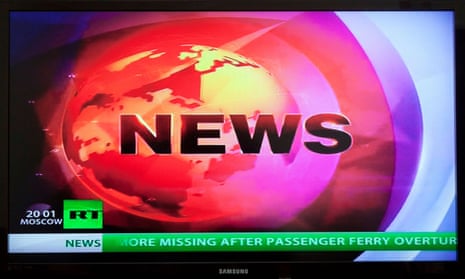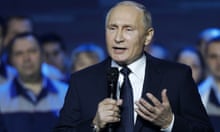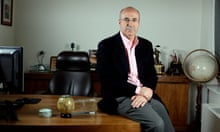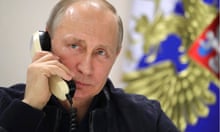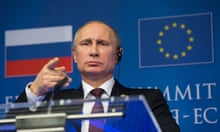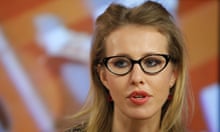The top story on the 9am news on RT – the Kremlin-backed English-language television channel formerly known as Russia Today – is about the EU’s renewed approval for a weedkiller produced by Monsanto. It includes rather elaborate coverage of a small-looking protest outside the European parliament, and excerpts from a debate on the safety or otherwise of glyphosates. On the strength of this opening five minutes, I might once have been tempted to conclude that it was a slow news day, but on RT every day is a slow news day.
According to its detractors, RT is Vladimir Putin’s global disinformation service, countering one version of the truth with another in a bid to undermine the whole notion of empirical truth. And yet influential people from all walks of public life appear on it, or take its money. You can’t criticise RT’s standards, they say, if you don’t watch it. So I watched it. For a week.
Following the Monsanto report, there is a roundup of anti-terrorist measures being implemented across Europe for the Christmas period – concrete barriers positioned outside Christmas markets, wrapped up like giant presents, that sort of thing – followed by a warning from newsreader Rory Suchet that 100% safety is “impossible to ensure”.
Suchet, the son of former ITV newsreader John Suchet and the nephew of actor David Suchet, has been working for RT since 2009. The offspring of well-known people feature often on RT. Sophie Shevardnadze, who presents Sophie & Co, is the granddaughter of former Georgian president and Soviet foreign minister Eduard Shevardnadze. Tyrel Ventura, who presents Watching the Hawks on RT America, is the son of wrestler-turned-politician Jesse Ventura. His co-host is Oliver Stone’s son Sean.
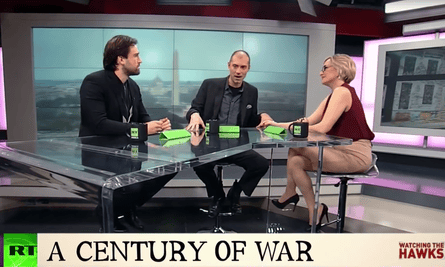
Russia Today was launched in 2005. Svetlana Mironyuk, the director of state-run RIA-Novosti, the news agency that oversees the channel, said at the time that western perceptions of Russia came down to three words: communism, snow and poverty. “We would like to present a more complete picture of life in our country,” she said.
But Russia barely figures in RT’s coverage; its main stories tend to concern the Middle East, or European infighting or social injustice in the US. Its overarching narrative is a tale of the west’s unrelenting decline. Its regular financial programme is called Boom Bust. On the Keiser Report, former US stockbroker Max Keiser says that “Donald Trump is helping to ease America into being a second-tier country, and I think that’s the most responsible thing he could do”. He suggests that Americans will have to learn to live on $3,000 or $4,000 a year, “or give in to your Chinese overlords”. His guest agrees with him. On RT, everybody agrees with everybody.
When Russia does make the news on RT, the Kremlin has little to worry about. Earlier this week, the main story was about a possible blanket ban on Russian Olympic athletes implicated in the doping scandal. Over the course of the day, reports repeatedly cited a “persistent lack of evidence” for a state-sponsored doping regime and sought to characterise the whole scandal as a western propaganda exercise aimed at undermining the next Russian presidential election. Foreign governments deploying disinformation to influence elections – where do they get this stuff?
That day’s BBC Radio 4 lunchtime news did carry a brief report about the upcoming Winter Olympics, but it was about security concerns in South Korea; it didn’t mention the doping scandal at all. That is probably because the doping scandal wasn’t really news that day. Four Russian athletes had been banned for life the previous week; an announcement on further bans was still a week away. The McLaren report, which offered firm evidence that Russia operated a state-sponsored doping regime, came out last year.
RT’s stated mission is to offer an “alternative perspective on major global events”, but the world according to RT is often downright surreal. Fringe opinion takes centre stage. Reporting is routinely bolstered by testimony from experts you have never heard of, representing institutions you have never heard of. A later update of that Christmas terrorist story gave ample airtime to “political commentator” Graham Moore, who turns out to belong to something called the “White Pendragons” and whose most recent YouTube posting on “civic nationalism” has garnered just 177 views at the time of writing, including mine.
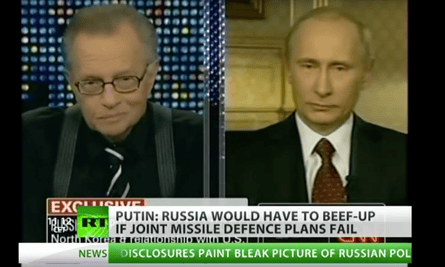
On Crosstalk, RT’s flagship discussion programme hosted by an American in a bow-tie called Peter Lavelle, one regular participant, Victor Olevich, is described as “a leading expert at the Centre for Actual Politics”. A Google search for “the centre for actual politics” produces precisely one hit – from a previous Crosstalk transcript.
That is not to say the channel is peopled entirely by nonentities: lots of present and former UK politicians from the left and the right turn up on RT regularly. Nigel Farage has been on; so has Ann Widdicombe. George Galloway co-hosts a chatshow with his wife. The Commons register of interests shows that, in the past two years, MPs including David Davies, Rosie Duffield, Mike Freer and Nigel Evans have been paid up to £1,000 an hour to appear on RT programmes. Former Scottish leader Alex Salmond recently launched his own programme. And it’s not just politicians: Larry King and Stan Collymore both make programmes for RT. Germaine Greer and Peter Tatchell have appeared on it, along with a number a journalists who write for, among other publications, the Guardian.
Some MPs, notably David Gauke, have refused to speak to RT. David Lammy has resolved not to appear on the channel in future. But David Davies (the Monmouth backbencher, not Brexit minister David Davis) has defended his appearances on the satirical show Sam Delaney’s News Thing. “The News Thing has given me a fair chance to explain my opinions on Brexit, immigration and transgender issues, for which I am grateful,” he told the Observer this month. “Sadly, I have not received the same courtesy from the British Broadcasting Corporation.”
To be fair, much of what one sees on RT is pretty harmless, or at least inconsequential. Over the course of a week, I watched one debate on gender issues that seemed fairly sensible, even mildly enlightening. “The annoying thing about RT is that some of the reporting is very good and genuine,” says Misha Glenny, the author of McMafia. “The trick is trying to differentiate that from the propaganda. The Russians have moved on since the days of Pravda, the Soviet Communist party newspaper, or Radio Moscow International during the cold war – at least then you knew it was all guff, coming out of the Ideological Secretariat. RT is designed to confuse and muddy the waters. That mixture of genuine and guff leaves you baffled and disoriented, which, I guess, is the point.”
In 2010, RT America was launched, followed by RT UK in 2014. Certain programmes are made under these auspices in Washington and London – and some RT America shows turn up on RT UK – but much of the time you are getting RT International programming from Moscow. Many of the British and American reporters on its roster have been with the channel since 2005; some were recruited straight from journalism school. According to a 2010 article in the Columbia Journalism Review, even from the beginning these inexperienced recruits were paid six-figure salaries for five days’ work a fortnight.
While the exact nature of the relationship between RT and the Russian state is never made apparent, critics say it cannot be overplayed: for them, RT is the Russian state. The channel’s defenders – almost exclusively people who work for it and appear on it – say they are free from the Kremlin’s influence and unafraid to speak truth to power. But in the US, RT America has been obliged to register as a foreign agent. RT UK has been reprimanded by Ofcom a dozen times for lack of balance.
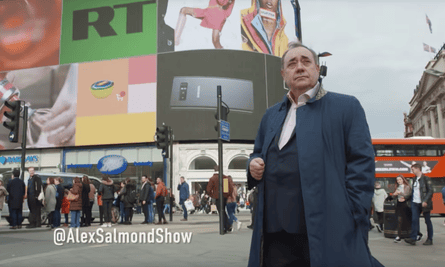
Peter Pomerantsev, author of Nothing Is True and Everything Is Possible, about Putin’s Russia, and now a senior visiting fellow in global affairs at the London School of Economics, was in Moscow working in television when Russia Today first started hiring graduates from Britain and the US. “The people were really bright, they were being paid well,” he says. But they soon found they were being ordered to change their copy, or instructed how to cover certain stories to reflect well on the Kremlin. “Everyone had their own moment when they first twigged that this wasn’t like the BBC,” he says. “That, actually, this is being dictated from above.” The coverage of Russia’s war with Georgia in 2008 was a lightbulb moment for many, he says. They quit.
There are clearly varying levels of independence at RT. Larry King’s shows are produced by his own company, Ora TV. Galloway’s programme is preceded by a warning that “the views and opinions expressed in the following programme do not necessarily coincide with those of RT”. But some of the channel’s reporters have complained of interference and bias. In 2014, RT America newsreader Liz Wahl resigned on air over the channel’s coverage of the Crimea crisis. Later that year, correspondent Sara Firth also quit after tweeting: “We do work for Putin. We are asked on a daily basis, if not to totally ignore, then to obscure the truth.”
One open question is: who is watching RT, besides me? The service claims to have access to a worldwide audience of 700 million people – you can get it online, on Sky, Freeview or in almost any hotel – but RT has never released actual UK viewing figures. The most recent figures available from the Broadcasters’ Audience Research Board gave RT a weekly reach of 413,000 viewers for the week 13-19 November (compared with 4.4 million for Sky News, and 7.3 million for BBC News). That is an audience share of 0.02%. But RT is big on Twitter and YouTube. “Its social media is much more important than the channel, because no one really watches that,” says Pomerantsev.
If you went by its adverts, you might initially think it was viewed exclusively by people who are desperate to buy gold bullion, over-50s travel insurance or funeral protection policies. But if you watch long enough, you will also see ads for Samsung, Maltesers, Whiskas and Extra gum. Evidently these brands think there is someone out there to sell to.
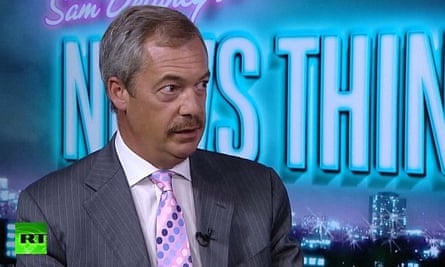
The basic cycle of RT’s schedules is simple: the news comes every hour at the top of the hour, followed by some sort of analysis or documentary at half past. Even for a rolling news channel, it is insanely repetitive. The news reports often barely differ from one hour to the next, and its regular programmes – Going Underground, Crosstalk, On Contact, The Keiser Report – are broadcast with numbing frequency, and updated infrequently. In one 24-hour period, I caught the same documentary – about a mysterious sleeping sickness affecting residents of a former mining town in Kazakhstan – three times. It was made in 2015.
RT is never more surreal than when the topic is RT itself. On a recent edition of Crosstalk, the panellists discussed RT America’s new status as a registered foreign agent. “Civil liberties groups, the mainstream media, they’re all silent on this,” said one. “Where is the ACLU [the American Civil Liberties Union]? This is a blatant infringement of free speech!” Everyone else, as usual, concurs. Even I agree that the ACLU’s lack of interest in the case is telling, but perhaps not in the way they think.
In response to accusations a few weeks ago that the channel is a mere propaganda mouthpiece for Putin, Sam Delaney mounted an odd stunt on his satirical show. He produced what he called “Putin’s Lie Machine” – a vintage computer prop with blinking lights that churned out “fake news” headlines, challenging MP Michael Fabricant to guess whether they were true or not. It wasn’t remotely satirical, or even slightly funny (as you might imagine, Fabricant was no help), but it did treat the accusations against RT as if they were too preposterous to address head-on. And they are not preposterous.
More than outright lies, RT deals in moral equivalency. Its defenders don’t deny bias; they deny the possibility of objectivity. They say western media is equally biased. They liken RT to state broadcasters such as the BBC, France 24 and al Jazeera. They say other news channels have been sanctioned by Ofcom. It’s a triumph of cynicism: we’re all just as bad as each other.
